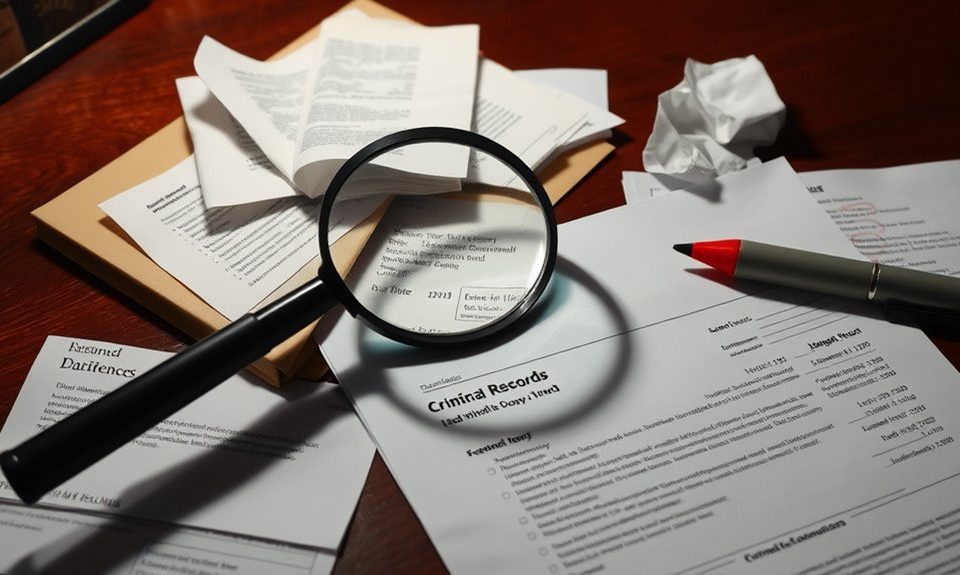Background checks offer a variety of benefits, enhancing safety and security within organizations. They reduce the risk of fraud and negligent hiring while improving the quality of hires. Tenant reliability is also strengthened through thorough screening processes. These checks guarantee legal compliance, providing protection against potential claims. Additionally, they streamline decision-making and foster trust among employers and landlords, contributing to a positive workplace culture. For an all-encompassing understanding of these advantages, further insights await.
Key Takeaways
- Background checks enhance hiring quality by providing insights into candidates’ histories, reducing risks of misconduct and misrepresentation.
- They ensure compliance with legal standards, minimizing liability and protecting organizations from potential discrimination claims.
- Conducting thorough background checks fosters a culture of trust, integrity, and safety within the workplace.
- They improve tenant reliability by analyzing rental histories, leading to stable and responsible tenancy.
- Background checks streamline decision-making processes, enhancing organizational reputation and attracting quality applicants.
Enhanced Safety and Security

Although conducting a background check may seem like a procedural step, it plays a crucial role in enhancing safety and security for organizations and individuals alike. A thorough background investigation serves as a cornerstone for effective safety protocols, enabling organizations to implement robust security measures. By engaging in extensive risk assessments and threat evaluations, companies can identify potential vulnerabilities within their workforce. This proactive approach to workplace security not only fosters employee safety but also reinforces crime prevention efforts through well-defined safety policies. Regular security audits further guarantee that these measures remain effective and relevant. Ultimately, the integration of background checks into organizational practices is fundamental to creating a secure environment conducive to trust and productivity. Additionally, background checks reduce risks associated with hiring errors, ensuring that the right candidates are selected for the job.
Reduced Risk of Fraud
Conducting background checks is instrumental in mitigating the risk of fraud within organizations. By identifying any criminal history and verifying employment credentials, employers can make informed decisions that protect their assets and reputation. This proactive approach not only safeguards against potential deceit but also fosters a culture of trust and integrity in the workplace. Additionally, thorough criminal record verification can help uncover past activities that may pose risks to the organization.
Identify Criminal History
When organizations prioritize background checks, they markedly enhance their ability to identify potential criminal histories, thereby reducing the risk of fraud. A thorough examination of criminal records allows organizations to assess the integrity of applicants, ensuring that individuals with concerning past behaviors do not compromise public safety. This proactive approach not only safeguards the organization but also fosters trust among clients and stakeholders. By uncovering concealed criminal histories, organizations can make informed hiring decisions, ultimately protecting their reputation and financial stability. In addition, understanding an individual’s criminal background helps in developing effective risk management strategies, which are vital in today’s complex environment. Consequently, identifying criminal history is an essential step in building a secure and trustworthy organizational framework.
Verify Employment Credentials
Verifying employment credentials serves as an essential component in the hiring process, complementing the identification of criminal history. Organizations employ various employment verification methods, such as direct employer inquiries, third-party services, and reference checks, to validate a candidate’s work history. Credential authenticity checks play a vital role in evaluating the legitimacy of academic achievements and professional certifications. By meticulously examining these credentials, employers can greatly reduce the risk of fraud, ensuring that candidates possess the qualifications they claim. This diligent approach fosters a trustworthy workplace culture, where integrity is valued and upheld. Ultimately, verifying employment credentials not only protects the organization but also cultivates a sense of accountability among prospective employees, enhancing organizational reputation and employee morale.
Improved Hiring Quality
Background checks play an essential role in enhancing candidate screening by providing employers with thorough insights into a candidate’s history. This process not only aids in identifying qualified individuals but also greatly reduces hiring risks associated with potential misconduct or misrepresentation. Consequently, organizations can make more informed decisions, ultimately leading to improved hiring quality. Additionally, conducting pre-employment screening is crucial for identifying risks and assessing candidate suitability before hiring.
Enhanced Candidate Screening
In an increasingly competitive job market, organizations that implement thorough background checks can greatly enhance their candidate screening processes, thereby improving overall hiring quality. By utilizing advanced screening technology, employers can obtain a detailed view of potential hires, allowing them to assess qualifications and fit more accurately. This meticulous approach not only strengthens the candidate experience but also fosters a sense of trust and transparency throughout the hiring process. Candidates are more likely to feel valued when organizations invest in understanding their backgrounds and capabilities. Ultimately, enhanced candidate screening leads to better hiring decisions, as employers can identify individuals whose skills and values align closely with the company’s mission and culture, setting the stage for long-term success.
Reduced Hiring Risks
How can organizations safeguard themselves against potential hiring pitfalls? Conducting thorough background checks greatly enhances candidate evaluation and mitigates hiring risks. By adhering to stringent hiring standards, organizations can guarantee that they select individuals who align with their values and operational needs.
- Uncover discrepancies in employment history
- Verify educational credentials
- Assess criminal background
- Evaluate credit history (if relevant)
- Validate professional licenses
These measures not only protect the organization from potential liabilities but also foster a workplace culture grounded in trust and integrity. By prioritizing candidate evaluation through background checks, organizations can make informed hiring decisions, ultimately leading to improved quality in their workforce and a more cohesive organizational environment.
Increased Tenant Reliability
Conducting thorough tenant background checks greatly enhances the reliability of prospective renters. By implementing effective tenant selection strategies, landlords can guarantee that they are choosing individuals with a proven track record of responsible behavior. A detailed rental history analysis reveals patterns in payment habits, previous evictions, and overall tenant conduct, allowing landlords to make informed decisions. This meticulous approach fosters a positive rental environment, reducing the likelihood of disputes and enhancing community stability. Additionally, reliable tenants contribute to the property’s upkeep and overall value, making background checks an indispensable tool in property management. Ultimately, these checks not only protect landlords’ investments but also promote trust and peace of mind among neighbors, fostering a harmonious living atmosphere. Furthermore, leveraging professional databases ensures access to up-to-date information that can reveal crucial insights about potential tenants.
Legal Compliance and Protection
While ensuring tenant reliability is essential, legal compliance and protection are equally important aspects of conducting background checks. Failing to adhere to compliance regulations can expose property managers to significant legal liabilities. Understanding the intricacies of these regulations fosters a safer environment for both landlords and tenants.
Key benefits include:
- Ensuring adherence to Fair Housing laws
- Reducing the risk of discrimination claims
- Protecting against potential fraud
- Minimizing liability for negligent hiring
- Establishing a foundation for informed decision-making, as conducting thorough pre-employment background checks ensures that landlords can make responsible and informed choices regarding tenant selection.
Better Workplace Culture

A thorough background check can greatly enhance workplace culture by fostering employee trust and reducing the likelihood of conflicts. When employees are confident in the integrity and reliability of their colleagues, team dynamics improve, leading to more effective collaboration. This proactive approach not only cultivates a positive environment but also contributes to overall organizational success. Additionally, a thorough vetting process helps identify potential risks that could disrupt workplace harmony.
Enhanced Employee Trust
Trust serves as a foundational element in fostering a positive workplace culture, and background checks can greatly enhance this trust among employees. By implementing effective trust building strategies, organizations can markedly uplift employee morale and create a cohesive work environment.
Key benefits of enhanced employee trust through background checks include:
- Increased transparency: Employees feel secure knowing that their colleagues have been vetted.
- Reduced anxiety: Assurance in team members fosters a more relaxed atmosphere.
- Improved communication: Trust encourages open dialogue and collaboration.
- Greater loyalty: Employees are more likely to stay with an organization that values integrity.
- Stronger teamwork: Trust among staff members enhances collaborative efforts.
In this way, background checks serve as an essential tool in nurturing an environment of mutual respect and reliability.
Reduced Workplace Conflicts
Implementing background checks can greatly reduce workplace conflicts, ultimately contributing to a healthier workplace culture. By thoroughly vetting potential employees, organizations can minimize the risks associated with hiring individuals whose past behaviors may disrupt team dynamics. This proactive approach fosters an environment where conflict resolution is more effective, as employees are more likely to engage in productive dialogue rather than resorting to disputes. Additionally, with a focus on team collaboration, employees can work together more harmoniously, knowing that their colleagues have been carefully screened for compatibility. This assurance not only enhances interpersonal relationships but also boosts overall morale, creating a cohesive environment conducive to success. Ultimately, background checks serve as a foundation for a more stable, respectful, and collaborative workplace.
Improved Team Dynamics
Background checks not only mitigate workplace conflicts but also enhance team dynamics, fostering a better workplace culture. By establishing a foundation of trust and transparency, organizations can greatly improve team collaboration and effective conflict resolution. The benefits of enhanced team dynamics are multifaceted:
- Increased Trust: Team members feel secure knowing their colleagues have been vetted.
- Improved Communication: Open dialogue flourishes in a positive environment.
- Higher Morale: A cohesive team often results in greater job satisfaction.
- Reduced Turnover: Employees are more likely to stay in a supportive atmosphere.
- Enhanced Performance: Collaborative teams achieve goals more efficiently.
Protection Against Negligent Hiring Claims
Employers frequently face the risk of negligent hiring claims, which can arise when an organization fails to conduct thorough background checks on potential employees. These claims hold significant legal implications, potentially resulting in costly lawsuits and damage to an organization’s reputation. By implementing extensive background checks, employers can mitigate the risk of hiring individuals with a history of misconduct or criminal behavior. This proactive approach not only protects the workplace environment but also safeguards the company from legal repercussions associated with negligent hiring. Additionally, a diligent vetting process demonstrates a commitment to employee safety and organizational integrity. Ultimately, investing in background checks serves as an essential measure to shield organizations from the complexities and consequences of negligent hiring claims. Furthermore, utilizing advanced technologies in background checks enhances the accuracy and efficiency of the investigative process.
Peace of Mind for Employers and Landlords
Conducting thorough background checks not only serves to protect organizations from negligent hiring claims but also provides significant peace of mind for employers and landlords alike. This assurance fosters a secure environment where both parties can thrive.
Key benefits include:
- Employer confidence in hiring decisions, reducing anxiety about potential risks
- Tenant assurance for landlords, ensuring responsible and reliable renters
- Enhanced safety and security within workplaces and residential properties
- Improved organizational reputation, attracting quality applicants and tenants
- A solid foundation for building trust and long-term relationships
- Background checks are crucial for identifying hidden information that may affect hiring or rental decisions.
Streamlined Decision-Making Process

While the decision-making process in hiring and tenant selection can often be complex and time-consuming, the implementation of thorough background checks greatly streamlines these procedures. By providing essential information about candidates or tenants, background checks enable decision-makers to make data-driven decisions with confidence. This not only reduces uncertainty but also expedites the evaluation process, allowing for more efficient hiring and tenant selection. Employers and landlords can swiftly identify red flags or verify qualifications, ultimately leading to faster decisions without compromising quality. The concise insights gained from background checks foster a more organized approach, ensuring that candidates and tenants are assessed fairly and thoroughly, thereby enhancing overall operational efficiency. Additionally, understanding the types of background checks available can further improve the quality of the decision-making process.
Fostering Trust and Transparency
Fostering trust and transparency within the hiring and tenant selection processes is essential for establishing strong relationships between decision-makers and candidates or tenants. By implementing background checks, organizations can bolster their trust-building efforts and enhance transparency initiatives. This not only reassures candidates and tenants but also strengthens the integrity of the selection process.
Key benefits of fostering trust and transparency include:
- Enhanced candidate experience
- Increased likelihood of long-term relationships
- Reduced risk of hiring or renting to unsuitable individuals
- Improved organizational reputation
- Promotion of a fair and equitable selection process
Through these practices, organizations can cultivate an environment where both candidates and decision-makers feel valued and understood, ultimately leading to more successful outcomes. Additionally, utilizing official channels for background checks ensures the accuracy and reliability of the information gathered, further supporting the trust-building process.
Frequently Asked Questions
How Long Does a Background Check Typically Take to Complete?
The duration of a background check varies considerably based on processing times and check types. Typically, basic checks can be completed within a few days, while thorough investigations may take several weeks to finalize.
Are There Any Legal Restrictions on Background Checks?
Legal restrictions on background checks often arise from privacy concerns, limiting the types of information that can be obtained. Organizations must navigate these regulations carefully to guarantee compliance while respecting individual privacy rights during the screening process.
What Information Is Included in a Typical Background Check?
A typical background check includes criminal history, employment verification, education records, credit reports, and references. This thorough information helps organizations assess an individual’s qualifications, reliability, and potential risks, fostering informed decision-making in hiring processes.
Can Individuals Dispute Information Found in Their Background Check?
Individuals can initiate a dispute process to contest inaccuracies in their background check. This procedure guarantees background accuracy, allowing them to provide evidence and seek corrections, ultimately protecting their reputation and guaranteeing fair assessment.
How Can I Initiate a Background Check for Someone?
To initiate checks, individuals may explore various background check methods, including online services, professional agencies, or direct requests to employers. Each method offers distinct advantages, ensuring thoroughness and accuracy in gathering necessary information about the subject.
Conclusion
To summarize, conducting thorough background checks offers a multitude of advantages, greatly enhancing safety and security while minimizing risks associated with fraud and negligent hiring. This process not only improves the quality of hiring and tenant selection but also guarantees legal compliance, fostering trust between employers and landlords. Ultimately, the implementation of background checks streamlines decision-making, providing peace of mind and establishing a foundation of transparency essential for successful professional relationships.






